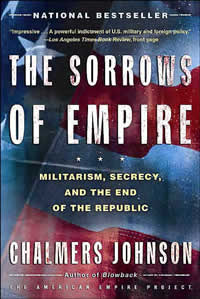Book Notes
 Chalmers Johnson, The Sorrows of Empire; Militarism, Secrecy, and the End of the Republic (New York: Metropolitan/Owl Books, 2004), 389pp.
Chalmers Johnson, The Sorrows of Empire; Militarism, Secrecy, and the End of the Republic (New York: Metropolitan/Owl Books, 2004), 389pp.
From George Washington and James Madison to Eisenhower's farewell address in 1961, some of our country's greatest leaders have warned about the dangers of standing armies and the military-industrial complex. In this second installment of his "inadvertent trilogy" about the costs and consequences of America's belligerent empire, Chalmers Johnson describes in meticulous detail the nature and extent of American militarism. In his first book, Blowback (2000), he warned that our global militarism and predatory economic policies virtually assure retaliations for decades to come. He published Blowback about eighteen months before the 9/11 attacks, and in retrospect his warning now reads like a diagnosis. His third volume, Nemesis (2006), is more like an autopsy; it describes our destiny with Nemesis, "the goddess of retribution and vengeance, the punisher of pride and hubris" (in Greek, "nemesis" means "to give what is due").
Unlike ancient empires, our imperial hegemony consists not of conquered territories but of military bases. Today the Department of Defense admits that America deploys 254,788 (double that number if you include dependents) military personnel to at least 725 military bases in 153 countries (there are 189 countries in the United Nations). That does not include numerous secret and officially nonexistent bases. Our own country is home to 969 separate bases in all fifty states. It's hard to believe, writes Johnson, that at the beginning of World War II our regular army consisted of 186,000 men; today it numbers 1.4 million. Nor is this any longer a citizen's army, but instead a professional warrior class (41% of whom are nonwhite).
Johnson's book documents our militarism beginning with the 1898 Treaty of Paris that ended the Spanish-American war; Woodrow Wilson's fervent belief in America's moral exceptionalism and obligation to export democracy to the world; the incestuous marriage of the military to the incredibly lucrative for-profit arms industry, and merry-go-round of former military and corporate personnel; America's sale of weapons to the world; our violations of international treaties and courts that have generated global distrust of much of what we say and do; the roles of oil (our import levels are "at the highest levels ever recorded") and Israel; and the predatory nature of economic globalization.
In a final chapter Johnson suggests four sorrows of our militaristic empire that he now considers all but unavoidable: a state of perpetual war, the loss of democratic processes and institutions, endemic lying by the state (glorification of war, disinformation, propaganda, etc.), and financial ruin. Empires don't last forever, he reminds us. In the last hundred years nine "empires" have collapsed: Nazi Germany, imperial Japan, Great Britain, France, the Netherlands, the Soviet Union, China, Austro-Hungaria, and the Ottomans. Despite our deep delusion about our good intentions and moral exceptionalism, we have no reason whatsoever to expect that history will treat our belligerence and hubris any differently. What we should expect is a meeting with Nemesis.


